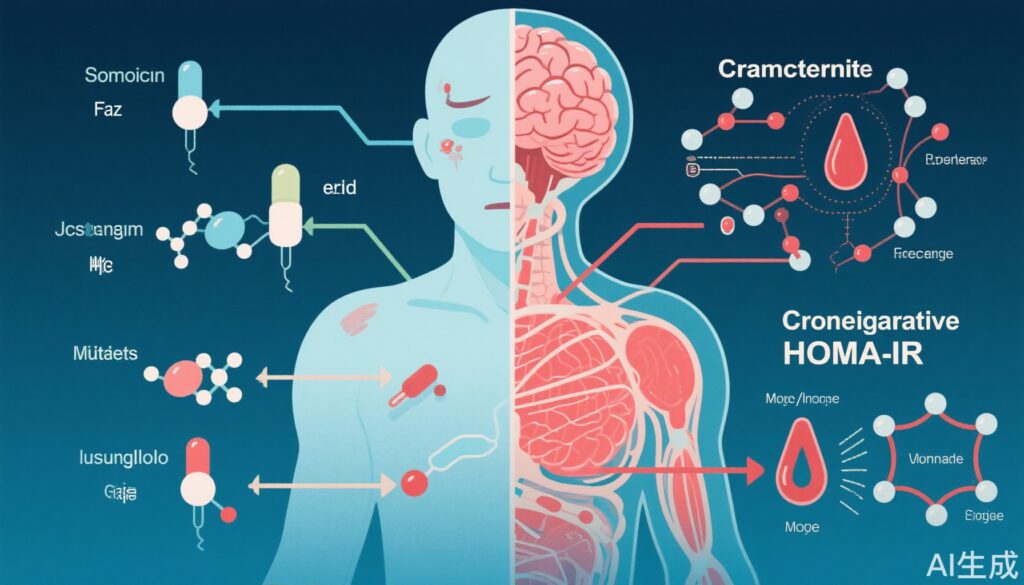Highlights
– Somatic symptoms of depression, such as fatigue and appetite changes, are significantly linked to both insulin resistance and inflammation in people with type 2 diabetes.
– Cognitive-affective symptoms of depression show minimal association with these metabolic markers.
– Associations persist after adjusting for demographic, anthropometric, and metabolic confounders, suggesting a biological underpinning.
– These findings may inform targeted screening and management strategies in diabetes care.
Study Background and Disease Burden
The intersection between depression and type 2 diabetes is a well-established but complex clinical problem. Depression is highly prevalent in individuals with diabetes and is associated with poorer glycemic control, increased complications, and higher healthcare utilization. Mechanistically, both conditions have been linked to systemic inflammation and insulin resistance, yet the precise pathways remain elusive. A key challenge is the heterogeneity of depressive symptoms, ranging from somatic complaints (e.g., fatigue, appetite changes) to cognitive-affective features (e.g., sadness, anhedonia). Understanding which symptom domains are most closely tied to diabetes-related pathophysiology could refine both clinical practice and research.
Study Design
This secondary analysis leveraged data from the Emotional Distress Sub-Study of the GRADE trial (NCT01794143), a large, multi-center, longitudinal study of individuals with type 2 diabetes. The analysis focused on two key biological markers:
– Insulin resistance, measured by the homeostasis model assessment (HOMA-IR), at baseline, year 1, and year 3.
– Inflammation, assessed via high-sensitivity C-reactive protein (hsCRP), measured every 6 months over a 3-year period.
Depressive symptoms were evaluated at baseline using the Patient Health Questionnaire-8 (PHQ-8), generating total, somatic, and cognitive-affective symptom scores. Cross-sectional and longitudinal associations were examined using linear and mixed-effects regression models, respectively, with adjustment for age, sex, BMI, and other metabolic confounders. The final analysis included 1,321 participants for HOMA-IR and 1,739 for hsCRP.
Key Findings
Cross-Sectional Analysis:
– A one-unit increase in PHQ-8 total score correlated with a 0.8% increase in HOMA-IR (p=0.007), indicating higher depressive burden is associated with greater insulin resistance at baseline.
– The association with hsCRP was weaker and non-significant cross-sectionally (0.6% increase, p=0.283).
– The somatic symptom cluster (e.g., fatigue, appetite disturbance) was strongly linked to HOMA-IR (5.8% increase per unit, p=0.004), while cognitive-affective symptoms were not.
– On item-level analysis, fatigue (3.6% increase, p=0.002) and appetite changes (3.5% increase, p=0.009) were the chief somatic drivers of insulin resistance.
Longitudinal Analysis:
– Over three years, a one-unit increase in PHQ-8 total score was associated with a 0.8% rise in hsCRP (p=0.014), indicating a persistent link between depressive symptoms and inflammation.
– No significant association was found between PHQ-8 total score and changes in HOMA-IR longitudinally.
– Importantly, only the somatic symptom cluster maintained a significant longitudinal association with hsCRP (5.2% increase per unit, p=0.017), reinforcing the primacy of somatic symptoms in the depression-diabetes inflammatory nexus.
– Cognitive-affective symptoms remained unlinked to either metabolic parameter over time.
Safety and Confounding Control:
All results were robust to adjustment for potential confounders, including demographic, anthropometric, and metabolic factors, supporting the specificity of the observed relationships.
Expert Commentary
These findings provide novel granularity to the depression-diabetes connection, distinguishing somatic from cognitive-affective depressive symptoms in their metabolic impact. While previous studies have broadly linked depression with metabolic dysregulation, this work clarifies that not all depressive symptoms are created equal: somatic symptoms—particularly fatigue and appetite disturbance—are the key drivers of adverse metabolic profiles. This aligns with emerging mechanistic data suggesting that somatic symptoms may reflect underlying inflammatory activity or metabolic stress, whereas cognitive-affective symptoms may be more closely tied to psychosocial and neurobiological factors.
Current guidelines (e.g., ADA Standards of Medical Care in Diabetes, 2024) emphasize screening for depression in diabetes, but these results suggest that symptom profiling could optimize risk stratification. The study’s longitudinal design further strengthens causal inference. However, limitations include the use of self-reported symptoms, potential residual confounding, and the restriction to patients with established type 2 diabetes, which may limit generalizability to earlier disease or non-diabetic populations.
Conclusion
This robust analysis from the GRADE Emotional Distress Sub-Study underscores that somatic symptoms of depression, more than cognitive-affective symptoms, are intimately linked with inflammation and insulin resistance in type 2 diabetes. These findings illuminate a biological bridge between depression and diabetes and raise the possibility of targeted interventions—pharmacologic or behavioral—that focus on somatic symptoms to improve metabolic outcomes. Future research should explore whether interventions aimed at somatic depressive symptoms can modify inflammatory or insulin resistance trajectories in diabetes care.
References
Ehrmann D, Krause-Steinrauf H, Uschner D, Wen H, Hoogendoorn CJ, Crespo-Ramos G, Presley C, Arends VL, Cohen RM, Garvey WT, Martens T, Willis HJ, Cherrington A, Gonzalez JS; GRADE Research Group. Differential associations of somatic and cognitive-affective symptoms of depression with inflammation and insulin resistance: cross-sectional and longitudinal results from the Emotional Distress Sub-Study of the GRADE study. Diabetologia. 2025 Jul;68(7):1403-1415. doi: 10.1007/s00125-025-06369-8 IF: 10.2 Q1 . Erratum in: Diabetologia. 2025 Jul;68(7):1585. doi: 10.1007/s00125-025-06433-3 IF: 10.2 Q1 . PMID: 39951058 IF: 10.2 Q1 ; PMCID: PMC12176517 IF: 10.2 Q1 .
American Diabetes Association. Standards of Medical Care in Diabetes—2024. Diabetes Care. 2024;47(Suppl 1):S1-S350.



